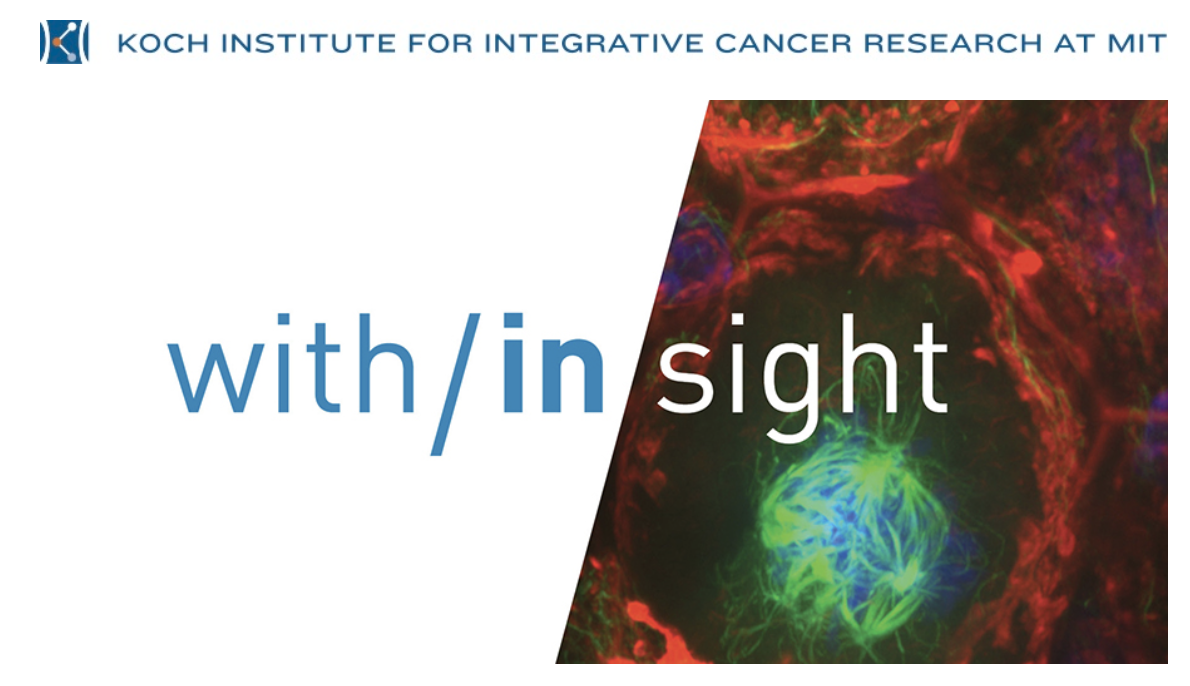August Bulletin
Issue 71
Community Notices
No seminar this month.
Next Marble Center seminar is on Monday September 19th, 4-5pm at the KI Luria Auditorium with an internal research update from the Belcher lab. More information will be shared soon.
SAVE THE DATE: SCIENCE with/in/sight: Cancer Research Futures.
Join our community on Thursday, October 13, 2022, for an evening of science and networking. Learn about new frontiers in cancer biology and engineering as you enjoy presentations and a panel discussion about the interface between bench research and clinical practice. This event is hosted in person and will be live-streamed on Zoom. In-person attendees are invited to an informal reception in the Koch Institute Public Galleries following the program.
Koch Institute Convergence Scholars visit to Alloy Therapeutics
Alloy Therapeutics, Inc. hosted the KI Convergence Scholars on August 8 for a tour of the Waltham, MA site and an overview of 82VS, the affiliated venture studio that pairs Alloy’s platforms and services with a team of company creation experts to efficiently launch new asset-centric companies.
In the News
A perspective on cancer nanomedicine
(Nature Reviews Cancer) The field of cancer nanomedicine seeks to overcome the inherent shortcomings of conventional cancer diagnostics and therapies. Yet despite the surge of interest in and attractive attributes of nanotechnologies, challenges remain in their clinical translation, prompting some to argue that they have not yet reached their true potential. In this Viewpoint article, Dr. Sangeeta Bhatia is featured in addition to three other experts in the field for her opinion on fulfilling the great promise of nanomedicine for the detection, diagnosis and treatment of patients with cancer. Read more…
nanoPRISM screen integrates drug delivery and omics. Using a curated nanoparticle library, Boehnke & Straehla et al. screened nanoparticle-cell interaction profiles of hundreds of cancer cells simultaneously. (Reference: Science Magazine).
Study Unveils How Different Cancer Cells Respond to Drug Delivery Nanoparticles
The results of a new study by researchers at MIT and the Broad Institute of MIT and Harvard may help to overcome some of the obstacles to the development of nanoparticle-based drugs. The team analyzed the interactions between 35 different types of nanoparticles and nearly 500 types of cancer cells, revealing thousands of biological traits that influence whether those cells take up different types of nanoparticles.
The researchers hope that the findings could help researchers better tailor their drug-delivery particles to specific types of cancer, or design new particles that take advantage of the biological features of particular types of cancer cells. “We are excited by our findings because it is really just the beginning—we can use this approach to map out what types of nanoparticles are best to target certain cell types, from cancer to immune cells and other kinds of healthy and diseased organ cells,” said Paula Hammond, PhD, an MIT Institute professor, head of the department of chemical engineering, and a member of MIT’s Koch Institute for Integrative Cancer Research. “We are learning how surface chemistry and other material properties play a role in targeting.” Read more…
Jobs
82VS Venture Associate, Alloy Therapeutics.
Alloy Therapeutics is seeking Venture Associates who are recent graduates from doctoral programs and interested in learning about biotech company building and investing. Venture Associates at 82VS will be exposed to all aspects of new company building, including science, medicine, strategy, financing, operations, and legal. This is a full-time position targeting a start date of late summer/early fall 2022 in Waltham, MAs. Read more...
Senior Scientist, mRNA - Scientist, Delivery and Formulation Development Sanofi.
Sanofi is seeking a highly motivated and scientifically rigorous individual to join the Delivery Formulations team as a Senior Scientist. As an experienced mRNA Scientist, you will develop novel lipid nanoparticle (LNP) formulations for mRNA delivery. In this role you will: lead formulation development of mRNA drug targets entailing: LNP formulations for in vitro/in vivo studies; evaluate novel ideas for formulation optimization and increasing stability of formulations; develop novel formulations and explore new processes for formulation design; work closely and build relationships with select CROs with focus on in vivo studies, drug carrier design/development, assay development; prepare technical reports and presentations for clear communication of scientific findings across interdisciplinary teams; promote innovation, state of the art technologies and propose strategies using publications to improve the products; and make scientific presentations and report project progress within mRNA CoE Formulation teams and with partners and in international forums. Read more…
Funding opportunities
| Funding Source | Grant ID | Deadline | Convergent Science Cancer Consortium Development Award | N/A | August 17, 2022 | Toward Translation of Nanotechnology Cancer Interventions | PAR-22-071 | November 17, 2022 |
|---|








